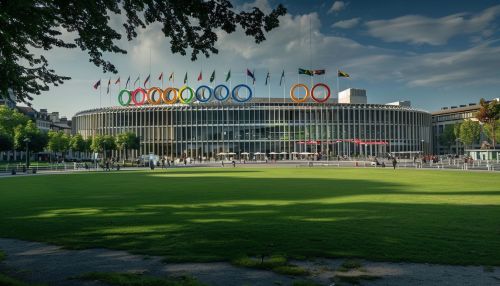International Olympic Committee
History
The International Olympic Committee (IOC) is a non-governmental sports organization based in Lausanne, Switzerland. It was established by Pierre de Coubertin on 23 June 1894 with Demetrios Vikelas as its first president. The IOC is the supreme authority of the worldwide modern Olympic movement, which organizes the modern Olympic Games and Youth Olympic Games, held in summer and winter, every four years.


The first Olympic Games organized by the IOC was held in Athens, Greece, in 1896; the first Winter Olympic Games were in Chamonix, France, in 1924. Until 1992, both Summer and Winter Olympics were held in the same year. After that year, however, the IOC shifted the Winter Olympics to the even years between Summer Games, to help space the planning of the two events from one another, and improve the financial balance of the IOC, which receives a disproportionately larger income in Olympic years.
Structure and organization
The IOC is governed by the Olympic Charter, under which the operation of the Olympic Movement is defined. The Olympic Charter is not a static document, but is updated periodically by the IOC Session, the general meeting of the members of the IOC. The IOC Session makes the most important decisions in the IOC, including the election of the IOC President and Vice-Presidents, the election of new IOC Members and honorary members, the approval of the Olympic programme, and the selection of the host city for the Olympic Games.
The IOC is composed of a maximum of 115 members, who are nominated by the IOC Executive Board and elected by the IOC Session. Members of the IOC do not represent their respective countries within the IOC, but are independent individuals who represent the IOC in their respective countries.
Role and responsibilities
The primary responsibility of the IOC is to supervise the organisation of the summer and winter Olympic Games. This includes selecting the host city, overseeing the planning of the Olympic Games, updating and approving the sports programme, and negotiating sponsorship and broadcasting rights.
The IOC also promotes the Olympic values worldwide, particularly through the Olympic Education Programme. The Olympic values, which are outlined in the Olympic Charter, include excellence, respect, and friendship. The IOC also has a commitment to promoting women in sport, and to encouraging and supporting the promotion of sports ethics and the protection of athletes.
Controversies and criticisms
The IOC has been the subject of criticism for several reasons, including allegations of corruption, notably in the bidding process for the Olympic Games. The IOC has also been criticized for its handling of doping scandals and its decision to allow certain countries to participate in the Games despite human rights abuses.
